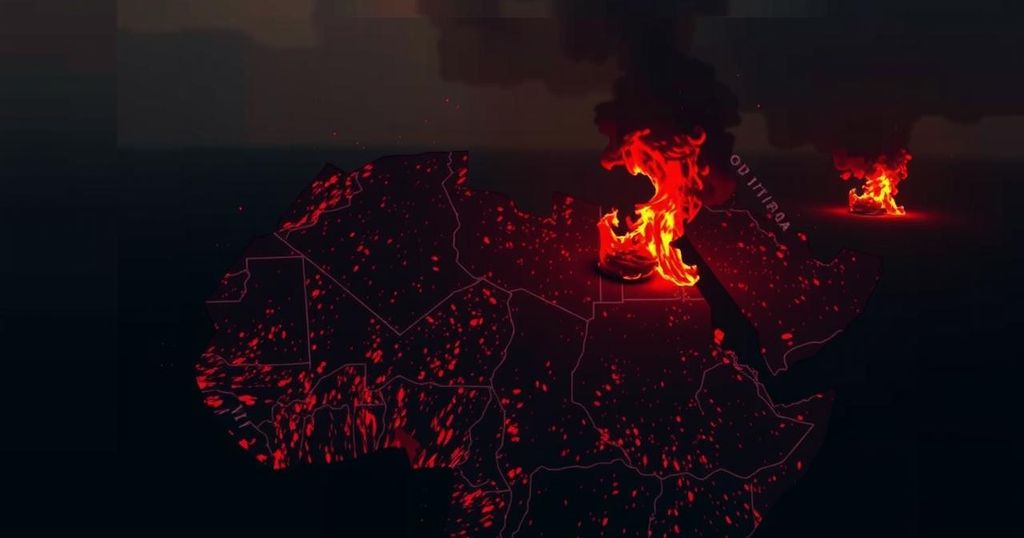Extremist violence has surged in the Sahel, particularly in Mali and Burkina Faso, as Islamic militant groups take advantage of political instability and economic hardship. Military juntas have failed to improve security, and human rights abuses have increased. Two main groups dominate: JNIM and the Islamic State. Their financial sustainability through local resources and trafficking complicates counter-terrorism efforts. The violence is spreading to neighboring countries, necessitating urgent international intervention.
Attacks by Islamic extremists in the Sahel region of Africa have surged significantly in recent months, culminating in a rare assault on Bamako, the capital of Mali, which had not been attacked in nearly a decade. In a separate incident, over 100 individuals, both villagers and soldiers, were killed in Burkina Faso as al-Qaida-linked militants targeted a village while locals were assisting security forces in fortifying defenses. The Sahel has long been troubled by extremist violence, exacerbated by military coups in Mali, Niger, and Burkina Faso, which promised to secure citizens’ safety but instead have seen a dramatic rise in attacks, resulting in the deaths of 3,064 civilians in the first half of this year alone.
There are two major extremist factions in this unstable region: the al-Qaida-associated Jama’at Nusrat al-Islam wal-Muslimin (JNIM) and the Islamic State in the Sahel. Analysts indicate that the local populace tends to support JNIM more due to its integration with local rebel factions, while the Islamic State operates as a less organized coalition that primarily dominates the Lake Chad area. In addition to these groups, various local militias have emerged amid increasing ethnic violence, further complicating the security landscape.
The military juntas that control Mali, Niger, and Burkina Faso have exploited public discontent with previous governments viewed as corrupt and overly reliant on foreign powers, particularly France. However, since taking power, these juntas have severed ties with traditional allies and established new relationships with Russia, leading to a significant security void following the exit of Western forces. Consequently, local populations have become more susceptible to extremist recruitment, especially as economic hardships compound frustrations amidst a lack of job prospects.
These extremist groups sustain themselves financially through a variety of means, including local taxation, control over vital resources, and involvement in trafficking operations. They have developed a diversified business model that makes disruption efforts challenging, as eliminating one revenue source often leaves them with others to draw upon.
Prospects for stabilization in the Sahel remain bleak as political desperation mounts among military leaders, prompting predictions of further deterioration in security conditions. The proliferation of extremist violence has already stretched beyond the Sahel, with incursions reported in neighboring countries such as Benin and northern Nigeria. The international community, particularly Europe and the United States, is seeking to bolster counter-terrorism initiatives in these newer threats, but restricted access to independent journalism complicates efforts to accurately assess the situation and support local narratives.
In summary, the situation in the Sahel has escalated through both internal and external factors, creating a multifaceted crisis characterized by rampant violence, socioeconomic despair, and weakening governance. Immediate and coordinated international responses will be essential to address the complexities arising from the extremist presence and the evolving security challenges in the region.
The Sahel, a dry area located south of the Sahara Desert, has increasingly become a battleground for extremist groups, particularly those affiliated with al-Qaida and the Islamic State, amid a backdrop of military coups and civil unrest. Over the last decade, rising extremist violence has been met with attempts at military governance in Mali, Niger, and Burkina Faso, which have failed to curb attacks. Instead, these juntas have presided over escalating violence as extremist factions exploit local discontent and economic hardship to gain support.
In conclusion, the Sahel presents a complex picture of rising extremist violence where economic stagnation, political instability, and diminishing security cooperation have allowed groups like JNIM and the Islamic State to flourish. The military juntas have yet to provide the promised security, magnifying recruitment into extremist groups amid a backdrop of poverty. The situation requires urgent international attention, with a focus on providing sustainable economic opportunities and strengthening regional governance to effectively combat this escalating threat.
Original Source: www.voanews.com







